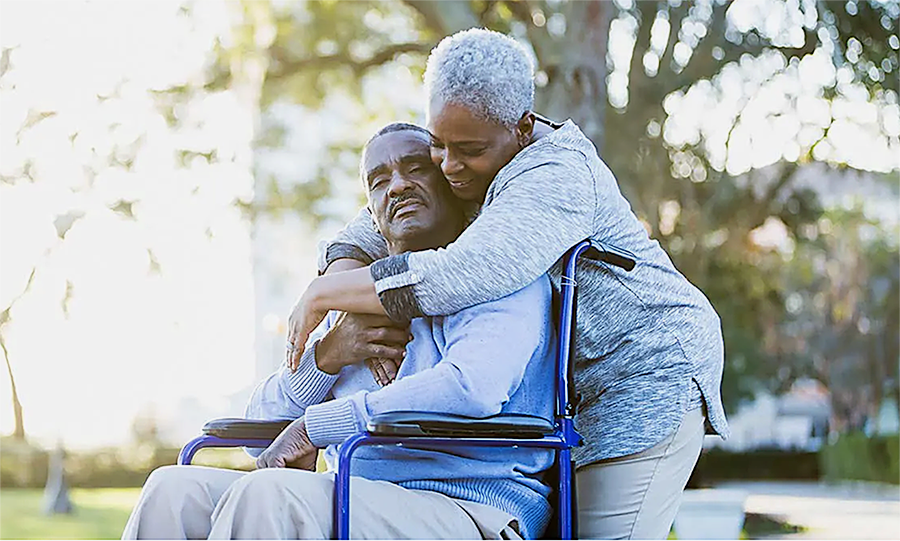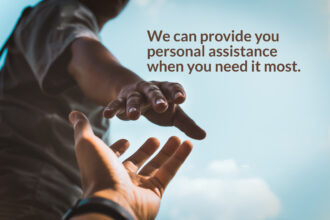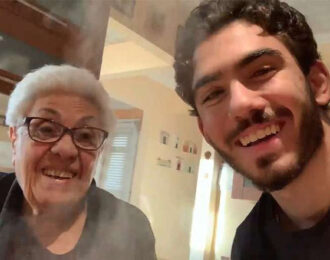Coping Strategies for Family Caregivers

Resources to help you during the pandemic and beyond
By Kevin Loria May 2021
Being a family caregiver—often a spouse or adult child who steps forward to care for another adult who is frail or ill—can be trying even in ordinary times. But during the COVID-19 pandemic, caregivers have lost access to many essential resources, such as adult day care, in-home help, and informal assistance from friends or neighbors.
“They’re suffering,” says Terri Harvath, PhD, director of the Family Caregiving Institute at the Betty Irene Moore School of Nursing at the University of California, Davis. “We know that social isolation has deleterious effects both on older adults and their family caregivers.”
But even though some resources are unavailable, Harvath and other experts say that caregivers still have options for getting help, taking care of themselves, and reducing overall stress.
Organizational Aid
Every state has some sort of caregiver support program, says Bob Stephen, vice president of AARP’s caregiving and health program. Call 211 to find out what’s available in your community.
The Family Caregiver Alliance can help you set up a plan to care for loved ones, Stephen says. Go to caregiver.org to register, and someone will reach out to you.
Just getting started caregiving or have general questions? Call AARP’s caregiving support line (877-333-5885), which can provide referrals and information about resources in your area. If you’re caring for someone with dementia, the Alzheimer’s Association has a 24/7 support line (800-272-3900) staffed by master’s level consultants who can help you navigate difficult decisions and answer legal, financial, and treatment questions.
Help From Friends and Family
With no definitive end to the pandemic in sight, it may be time for some families to expand their bubbles to ensure that one person isn’t handling all the caregiving responsibilities for an older adult, says Beth Kallmyer, vice president for care and support at the Alzheimer’s Association. Even family members or neighbors who don’t enter your bubble can help, Harvath says. They can pay bills remotely, stop by the pharmacy, drop off groceries, even pick up and do a load of laundry. “When somebody says, ‘Is there something I can do to help you?’ have a list ready and waiting,” she says.
Self-Care Tips
Sometimes caregivers need a reminder that it’s important to look out for themselves while caring for another person.
“I encourage them to put their own oxygen mask on first before helping others,” Harvath says. She recommends starting with steps such as taking 5 minutes a day to do something indulgent, like having a cup of tea and putting your feet up. When you can, extend that period for as long as possible.
Mindfulness meditation and exercise like yoga can be beneficial and reduce stress as well, Stephen says. Watching a movie, with or without the person you’re caring for, is an easy way to take a break, he adds. AARP and other groups do group screenings or offer programs through a virtual community center.
If other family members are caregivers and aren’t taking adequate care of themselves, mention the importance of self-care to them, Kallmyer says. “They often don’t want to ask for help; they feel it’s some sort of indictment on their relationship with the person or their abilities,” she says. Get them to reframe those thoughts so that they understand they’re doing their best, and that asking for help and taking breaks are necessary.
If Your Loved One Needs Medical Attention
For non-urgent care, ask the doctor whether telemedicine is an option. It’s been very beneficial during the COVID-19 era, helping caregivers and the people they look after get the medical help they need, says Stephen of AARP.
If the person you care for needs to go to a hospital, be aware that some facilities consider caregivers visitors and may not allow you to stay in their room, says Harvath of UC Davis. But some make exceptions for caregivers, so ask.
And if assisted living or a nursing home may be needed, start looking as soon as possible, because the pandemic has made the process lengthier, says Kallmyer of the Alzheimer’s Association.





